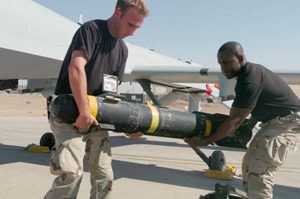Arming the Enemy
Tens of thousands of U.S. weapons have disappeared in Iraq. For years they are likely to be killing people across the globe, including Americans in Iraq and elsewhere.WASHINGTON — Of all that has been lost in Iraq, the case of the missing weapons does not figure much in the grim tally. At this point, what’s a few tens of thousands of unaccounted-for AK-47s?
Besides, Washington is gearing up for the sort of fight it cannot avoid but which does not fail to turn the stomachs of those who watch from a distance: A contretemps over whether the much-ballyhooed September status report on the Bush administration’s military “surge” is to be written by the White House or, as first promised, by Gen. David H. Petraeus — and whether or not the commander will give his congressional testimony in public or behind conveniently closed doors.
A midsummer report by the Government Accountability Office that the Pentagon “cannot fully account for about 110,000 AK-47 rifles, 80,000 pistols, 135,000 items of body armor, and 115,000 helmets” issued to Iraqi forces as of September 2005 did not stir the city’s stifling air. We know that just about everything we’ve done in Iraq has been sabotaged by incompetence. Not that the GAO specifically accused the Pentagon of this — just an incomprehensibly slipshod system in which the military failed to account for armaments given out to security forces long known to have dubious loyalty to the central Iraqi government and plagued with a record of desertion.
“Remember, the critical path for measuring progress was how quickly we could stand up these Iraqi battalions,” says Rep. Stephen Lynch, D-Mass., sponsor of legislation to require the Pentagon to institute better tracking for the small arms it is handing out. “In many cases, once they [Iraqi recruits] got a paycheck, they basically left. They went to their hometowns with their weapons and their equipment and never were heard from again.”
Lynch, who has visited Iraq seven times and has inspected a training facility for Iraqi security forces in Amman, Jordan, says that when he tried to get an accounting of 370,000 small arms that the U.S. had provided to Iraqis, he found only 3 percent were registered with a particular owner. “About 97 percent of the 370,000 weapons that we tracked were untraceable to any specific owner,” he says.
The GAO report and congressional investigations may understate the problem, Lynch says. Iraq is awash in weapons.
The Coalition Provisional Authority, the American regency that ran Iraq immediately after the 2003 invasion, allowed each Iraqi household to possess one automatic weapon. On a trip when he accompanied U.S. soldiers participating in house searches, Lynch says, the search typically began with the American asking, “Where’s the weapon, the weapon you’re supposed to have?” The standard household gun is an AK-47, for which ammunition is readily available, Lynch says, “much like we would buy a loaf of bread or a gallon of milk.”
Then there are the weapons caches from the huge stockpiles amassed during Saddam Hussein’s regime, unguarded and looted as the American military struggled with too few forces and too scant a plan for how to bring order to post-invasion Iraq. “Personally, I’m most concerned about the 4,000 to 6,000 shoulder-fired missiles that we know were in the Iraqi stockpiles,” says Matthew Schroeder, who tracks the international arms trade for the Federation of American Scientists.
Four planeloads of weapons, transferred by the Pentagon from unused stocks in Bosnia-Herzegovina for use in Iraq, may never have made it to Baghdad, according to a May 2006 investigation by Amnesty International. There are no documents showing the planes ever landed in Baghdad. U.S. military officials in Iraq told the group that there are no records to show the arms reached them, according to Colby Goodman, an arms transfer expert at Amnesty International-USA.
The Pentagon says it is now instituting better tracking procedures. But this is like saying we now realize we had too few forces in Iraq from the outset, or that we finally understand how the forces of sectarianism tear the country.
Tens of thousands of weapons that are unaccounted for and presumably missing could well be in Iraq, but in whose hands? They could have seeped beyond Iraq’s borders, and turn up one day in some faraway conflict where the international arms bazaar helps to fuel regional strife. “But how are we going to get the horse back into the barn?” Lynch asks.
We cannot, he believes. The track record on recovering missing weapons isn’t good. So add this tragedy to all the others that are the legacy of our involvement in Iraq.
Marie Cocco’s e-mail address is mariecocco(at)washpost.com.
© 2007, Washington Post Writers Group
Your support matters…Independent journalism is under threat and overshadowed by heavily funded mainstream media.
You can help level the playing field. Become a member.
Your tax-deductible contribution keeps us digging beneath the headlines to give you thought-provoking, investigative reporting and analysis that unearths what's really happening- without compromise.
Give today to support our courageous, independent journalists.



You need to be a supporter to comment.
There are currently no responses to this article.
Be the first to respond.